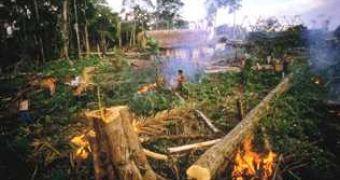Apparently, Indonesia only recently realized that its tropical rain forests are indispensable for the well-being of our natural world and decided that it is high time to start taking the appropriate measures to ensure their protection.
As Susilo Bambang, the country's president, informed the press, Indonesia is soon to become a world leader as far as sustainable forestry is concerned.
This might strike the public as a bit paradoxical, given the fact that throughout the 1970s and the 1980s no such concern for the environment made itself manifest in this part of the globe.
As Susilo Bambang explains, this is due to the fact that, at that time, the main priority was boosting the country's economy, and not environmental protection.
Therefore, acres of forests found themselves cut down for the sake of economic development.
According to Mongabay.com, his exact words were: “It seemed the logical thing to do back then. We had lots of forests; we had to reduce poverty; we needed to grow our economy. As a result, there was a time when we experienced very serious deforestation.”
However, as the same source also cites, the president also argued that “Losing our tropical rain forests would constitute the ultimate national, global and planetary disaster. That’s why Indonesia has reversed course by committing to sustainable forestry.”
This new green-state-of-mind displayed by Indonesia's high officials is expected to lead to the planting of around 3.2 billion trees.
Moreover, the country's representatives argue that the nation is also ready to reduce emissions by roughly 25% until a 2020 deadline.
Presently, green-heads are concerned that this opinion shift is not so much an expression of a newly-found interest in environmental issues, but a direct consequence of the fact that Indonesia seems unable to abide by the rules and cut down on its gas emissions until 2020, as it previously said it would do.
Thus, some argue that instead of improving on its existing industries, the country wishes to balance out the amount of pollution it presently is responsible for simply by planting more trees.
Although it is our belief that Indonesia's decision to stop deforestations is a praise-worthy one, we hope that the country will also attempt to improve on its ecological footprint.

 14 DAY TRIAL //
14 DAY TRIAL //